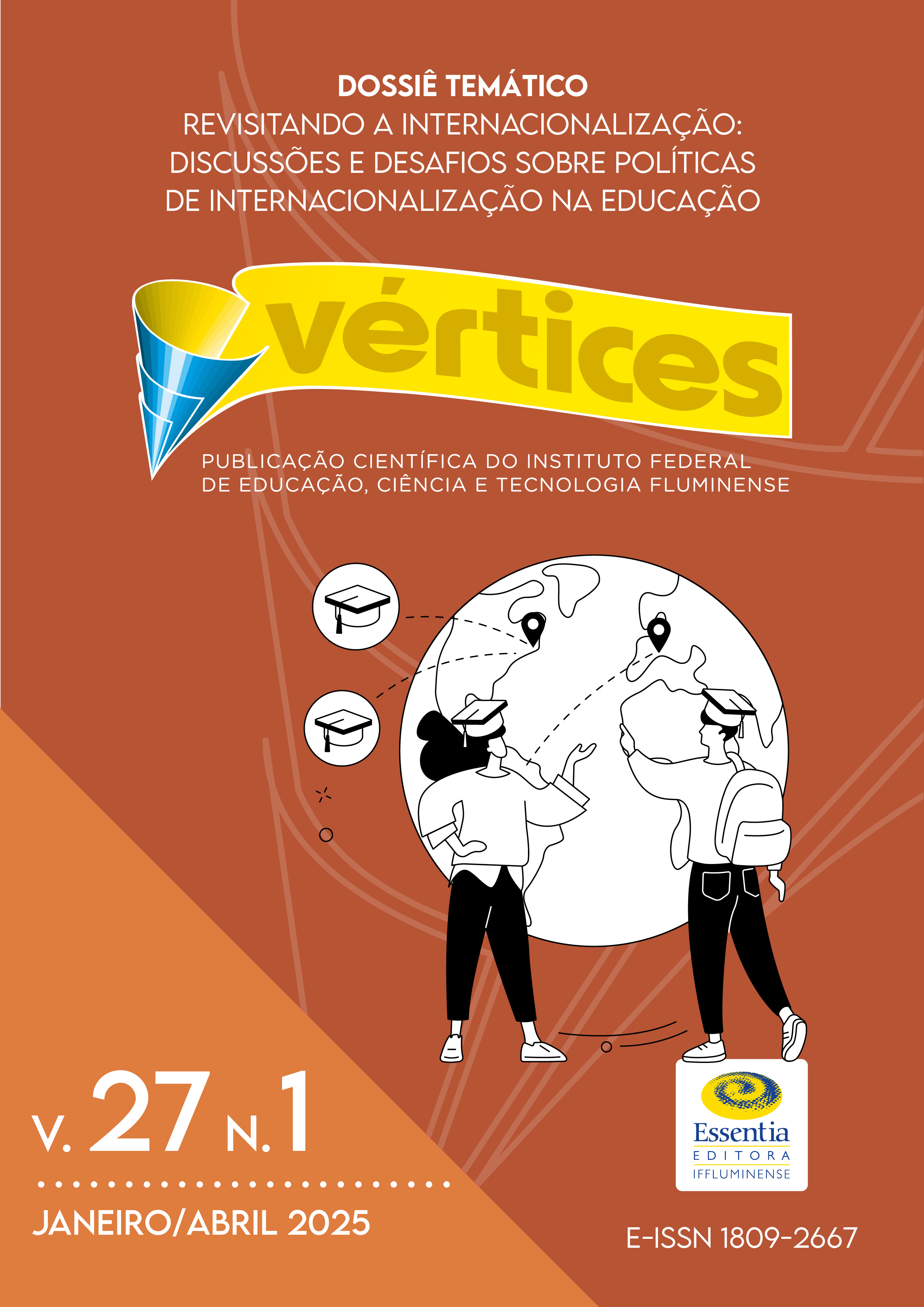Motivations, impressions, and emotions: PUCPR's “Global Classes” internationalization program from the students’ point of view
DOI:
https://doi.org/10.19180/1809-2667.v27n12025.23414Keywords:
at home internationalization, second language teaching, emotions in learningAbstract
With the search for internationalization processes in higher education, Brazilian universities have also begun incorporating programs that contribute to this learning. Based on this, this work sought to investigate the profile and perspective of students enrolled in the Global Classes disciplines provided by the PUCPR’s Internationalization in Home program, from a questionnaire answered by 97 students seeking to understand their motivations and emotions, through a bibliographic review. As a result, it was found that the participant's profile is composed of 70% of individuals who have already studied the language of the discipline, which favors emotions of confidence, calm, and enthusiasm about the language and content. However, there are still dysregulating emotions that can be motivated by the lack of monitors in the classroom, since 66.7% of students do not have this possibility. With this, it is concluded that the disciplines offer a favorable basis for integration and acquisition, together with the contents of the courses and the dynamics of each area. Still, it is perceived that this can be amplified since the construction of an emotionally adept person helps in self-regulation and the individual search of each student for acquisition.Downloads
References
BARANZELI, C. Modelo de internacionalização em casa – IaH. In: MOROSINI, M. (org.). Guia para a internacionalização universitária. Porto Alegre: EdiPUCRS, 2019. p. 189-201. Disponível em: https://editora.pucrs.br/download/livros/1383.pdf. Acesso em: 23 fev. 2024.
DÖRNYEI, Z. The L2 Motivational Self System. In: DÖRNYEI, Z.; USHIODA, E. (ed.). Motivation, Language Identity and the L2 Self. [S.l.]: Multilingual Matters, 2009. p. 9-42.
GIL, A. C. Métodos e técnicas de pesquisa social. 7. ed. São Paulo: Atlas, 2019.
IWANIEC, J. Motivation of pupils from southern Poland to learn English. System, v. 45, p. 67-78, 2014. DOI: https://doi.org/10.1016/j.system.2014.05.003. Disponível em: https://www.sciencedirect.com/science/article/pii/S0346251X14000888. Acesso em: 1 abr. 2023.
KNIGHT, J. Concepts, rationales, and interpretive frameworks in the internationalization of higher education. In: DEARDOFF, D. K.; DE WIT, H.; HEYL, J. D.; ADAMS, T. (ed.). The SAGE handbook of international higher education. London: SAGE Publications Inc, 2012. p. 27-42. Disponível em: https://books.google.com.br/books?id=kVPwBLnFGRQC&printsec=frontcover&redir_esc=y#v=onepage&q&f=false. Acesso em: 1 abr. 2023.
NUNES, L. B. Competências cognitivas e socioemocionais: Possibilidades estratégicas de Internacionalização. In: MOROSINI, M. (org.). Guia para a internacionalização universitária. Porto Alegre: EdiPUCRS, 2019. p. 203-219. Disponível em: https://editora.pucrs.br/download/livros/1383.pdf. Acesso em: 9 jul. 2024.
PONTIFÍCIA UNIVERSIDADE CATÓLICA DO PARANÁ. Plano estratégico de internacionalização – 2023-2028. Curitiba: [PUCPR], 2023.
PONTIFÍCIA UNIVERSIDADE CATÓLICA DO PARANÁ. Programa PUCPR Global Classes Manual. Curitiba: [PUCPR], 2018.
SERNA-BERMEJO, I.; LASAGABASTER, D. Why do students choose EMI courses? An analysis of their motivational drives. Porta Linguarum, n. 40, 2023. Disponível em: https://digibug.ugr.es/bitstream/handle/10481/83564/13.%2bIRATXE%2bSERNA.pdf?sequence=1&isAllowed=y. Acesso em: 19 jun. 2025.
WATERMAN, J.; FIGUEIREDO, E. H. D; FINARDI, K. R. Emotions of L2 Learners in Different Contexts and Modes. Studies in English Language Teaching, v. 11, n. 2, 2023.
YUKSEL, D.; SORUÇ, A.; HORZUM, B.; MCKINLEY, J. Examining the role of English language proficiency, language learning anxiety, and self-regulation skills in EMI students’ academic success. Studies in Second Language Learning and Teaching, Kalisz, v. 13, n. 2, p. 399-426, 2023. Disponível em: https://files.eric.ed.gov/fulltext/EJ1397297.pdf. Acesso em: 11 set. 2025.
Downloads
Published
Issue
Section
License
Copyright (c) 2025 Katleen Hack da Silva, Karina Aires Reinlein Fernandes

This work is licensed under a Creative Commons Attribution 4.0 International License.
The authors of the manuscript submitted to Vértices, hereby represented by the corresponding author, agree to the following terms:
The authors retain the copyright and grant Vértices the right of first publication.
At the same time the work is licensed under the Creative Commons Attribution 4.0 International License, allowing third parties to copy and redistribute the material in any medium or format and to remix, transform, and build upon its content for any legal purpose, even commercially, provided the original work is properly cited.
Authors will not receive any material reward for the manuscript and Essentia Editora will make it available online in Open Access mode, through its own system or other databases.
Authors are authorized to enter into additional contracts separately for non-exclusive distribution of the version of the work published in Vértices (eg, publish in institutional repository or as book chapter), with acknowledgment of authorship and initial publication in this journal.
Authors are permitted and encouraged to disseminate and distribute the post-print (ie final draft post-refereeing) or publisher's version/PDF at online information sources (eg, in institutional repositories or on their personal page) at any time after the first publication of the article by Vértices.
Essentia Editora may make normative, orthographic and grammatical changes in the originals in order to maintain the standard language, with the final consent of the authors.
The content and opinions expressed in the manuscript are the sole responsibility of the author (s).























1.png)



